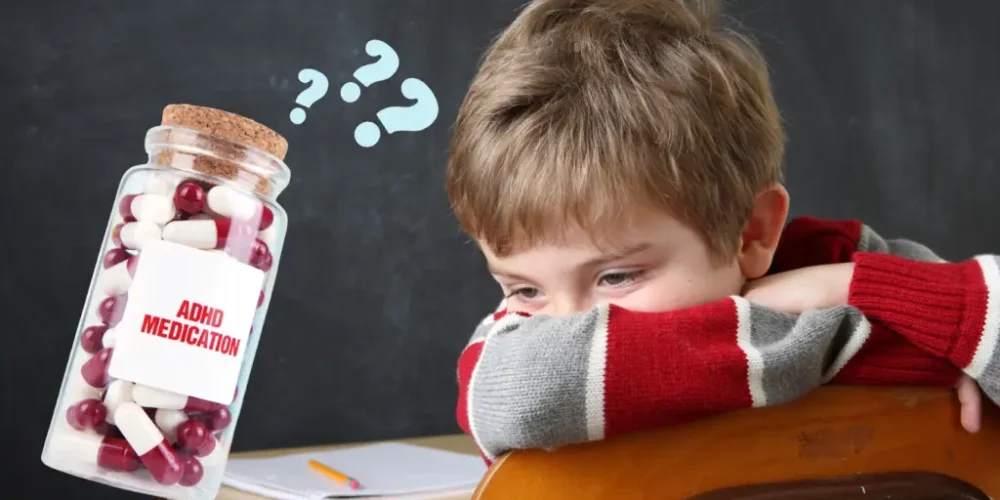Hidden Dangers of ADHD Medications, It is a topic that few specialists talk about. ADHD medications have been a cornerstone in managing symptoms for countless individuals, offering improved focus and reduced hyperactivity. However, while these treatments are widely prescribed, there are often overlooked risks that come with their use. Understanding the hidden dangers of ADHD medications is essential for making informed decisions about treatment options and safeguarding both mental and physical health.
What Are the Hidden Dangers of ADHD Medications?
ADHD medications, such as stimulants and non-stimulants, are often hailed as life-changing treatments for individuals struggling with attention deficits and hyperactivity. However, beneath their benefits lies a range of potential hidden dangers of ADHD medications that may not always be apparent at first glance.
Some of the most concerning hidden dangers include:
- Physical Side Effects: Common issues like insomnia, appetite suppression, and cardiovascular concerns can escalate over time, affecting overall health.
- Mental Health Impacts: Anxiety, mood swings, and even depression are reported side effects that can significantly affect emotional well-being.
- Dependency and Abuse: Stimulant ADHD medications carry a risk of misuse, leading to dependency or even addiction in certain cases.
- Long-Term Health hidden dangers of ADHD medications : Prolonged use has been linked to potential changes in brain chemistry, impacting cognitive function and development.
- Unknown Effects on Growing Children: For younger patients, the long-term consequences of consistent medication use are still under research, raising concerns about developmental impacts.
Understanding these hidden dangers of ADHD medications is essential for patients and caregivers to weigh the benefits against the risks and explore alternative treatments when necessary. With awareness and proper guidance, individuals can make more informed decisions about managing ADHD.
Understanding the Side Effects of ADHD Drugs
ADHD medications, particularly stimulants like Adderall, Ritalin, and Vyvanse, are commonly prescribed to help manage symptoms such as inattention, impulsivity, and hyperactivity. While these drugs can be highly effective, they also come with a range of side effects that can vary depending on the individual and the specific medication.
Common side effects include:
- Appetite Suppression: Many ADHD medications reduce appetite, which can lead to weight loss and nutritional imbalances, particularly in children.
- Sleep Disturbances: Insomnia is a frequent side effect, as stimulants tend to increase alertness, making it difficult to fall or stay asleep, especially when taken later in the day.
- Increased Heart Rate and Blood Pressure: Stimulants can elevate heart rate and blood pressure, which may be concerning for individuals with preexisting heart conditions or those at risk for cardiovascular problems.
- Mood Changes: Individuals may experience irritability, anxiety, or mood swings, especially as the medication wears off. Some people also report feelings of depression or emotional instability.
- Headaches and Stomach Issues: These include headaches, stomachaches, and nausea, which can cause discomfort and disrupt daily life.
- Tics or Motor Movements: Some individuals may develop involuntary motor movements or vocal tics, which can be distressing or distracting.
- Cognitive Effects: In some cases, individuals report feeling “zoned out” or experiencing difficulty concentrating, which can counteract the intended benefits of the medication.
Recognizing these side effects is crucial for both patients and healthcare providers in managing ADHD effectively. By monitoring these symptoms and adjusting dosages or switching medications, individuals can minimize the hidden dangers of ADHD medications while still benefiting from treatment.

Long-Term Risks: The Hidden Dangers of ADHD Medications
While ADHD medications can provide immediate relief for symptoms, their long-term use raises important questions about safety and potential risks. For many, these medications are a lifelong necessity, but the hidden dangers of extended reliance on ADHD drugs warrant careful consideration.
1. Dependency and Tolerance
Over time, the body can develop a tolerance to stimulant medications, requiring higher doses to achieve the same effect. This can lead to dependency, making it difficult to function without the medication and increasing the risk of misuse or addiction.
2. Cardiovascular Issues
Long-term use of stimulants has been linked to elevated blood pressure and heart rate, which may increase the risk of cardiovascular problems, such as heart disease or arrhythmias, especially in individuals with preexisting conditions.
3. Impact on Brain Development
For children and adolescents, whose brains are still developing, prolonged use of ADHD medications may alter neural pathways. While more research is needed, some studies suggest that long-term use could affect cognitive functions or emotional regulation.
4. Mental Health Concerns
Extended use has been associated with mood instability, anxiety, and, in some cases, depression. The cyclical nature of stimulant medication—highs during efficacy and lows during wear-off—can contribute to emotional difficulties over time.
5. Growth Suppression in Children
Stimulant medications can suppress appetite, leading to inadequate nutrition and, in some cases, stunted growth in children. Monitoring growth patterns is critical for young patients on ADHD medications.
6. Social and Psychological Dependence
Reliance on medication for daily functioning may affect self-esteem and create a belief that one cannot succeed without it, potentially leading to psychological dependence.
Understanding these long-term hidden dangers of ADHD medications allows patients, caregivers, and healthcare providers to make informed decisions about the duration of treatment. Regular monitoring, exploring alternative therapies, and reassessing the need for medication can help mitigate these hidden dangers while maintaining the benefits of ADHD management.
The Impact of ADHD Medications on Mental Health
ADHD medications, while effective for managing symptoms, can have significant effects on mental health, both positive and negative. These impacts vary by individual and are influenced by factors such as the type of medication, dosage, and preexisting mental health conditions. Understanding these potential effects is crucial for ensuring that treatment remains beneficial and does not inadvertently cause harm.
Positive Impacts on Mental Health
- Improved Focus and Emotional Regulation: By reducing symptoms like inattention and impulsivity, ADHD medications can help individuals feel more in control of their lives, leading to improved self-esteem and reduced frustration.
- Enhanced Productivity: Success in work, school, or daily tasks often alleviates stress and anxiety, providing a mental health boost.
Negative Impacts on Mental Health
- Anxiety and Irritability: Some individuals report feeling more anxious or irritable while on ADHD medications, particularly stimulants. These feelings can sometimes exacerbate preexisting anxiety disorders.
- Mood Swings: The wear-off effect of stimulant medications can lead to sudden mood changes, causing emotional instability or feelings of sadness and frustration.
- Increased Risk of Depression: While rare, some individuals experience depressive symptoms as a side effect of ADHD medication, especially if the dosage is too high or not well-suited to their needs.
- Overreliance on Medication: A psychological dependency can develop, where individuals feel they cannot function or succeed without their medication, potentially affecting their confidence and mental well-being.
- Sleep Disturbances: Poor sleep caused by stimulants can lead to fatigue, irritability, and increased susceptibility to mental health struggles.
Addressing Mental Health Challenges
To minimize hidden dangers of ADHD medications on mental health :
- Regular Monitoring: Work closely with a healthcare provider to monitor emotional responses and adjust dosages as needed.
- Therapeutic Support: Combine medication with behavioral therapy or counseling to address emotional and psychological needs.
- Alternative Medications: Non-stimulant options may be better suited for individuals who experience severe side effects from stimulants.
Recognizing the mental health impacts of ADHD medications is essential for a holistic approach to treatment, ensuring both physical and emotional well-being are prioritized.
Hidden dangers of ADHD medications on Physical Health
While ADHD treatments can be highly effective in managing symptoms like hyperactivity and inattention, they are not without potential physical hidden dangers of ADHD medications. Both stimulant and non-stimulant medications may cause side effects that impact various aspects of physical health, ranging from mild discomfort to more serious conditions. Understanding these concerns is key to managing ADHD safely.
1. Cardiovascular Risks
Stimulant medications, such as Adderall and Ritalin, can increase heart rate and blood pressure. For individuals with preexisting heart conditions or a family history of cardiovascular issues, this can pose significant hidden dangers of ADHD medications, including heart palpitations, arrhythmias, and even heart attacks in rare cases.
2. Appetite Suppression and Weight Loss
Many ADHD medications reduce appetite, leading to unintended weight loss. This is particularly concerning for children and adolescents, as it may affect growth and overall nutritional health.
3. Sleep Disturbances
Difficulty falling asleep or staying asleep is a common side effect of stimulant medications. Chronic sleep disruption can lead to fatigue, weakened immunity, and other health problems.
4. Gastrointestinal Issues
Some individuals experience nausea, stomachaches, or digestive discomfort while taking ADHD medications. These symptoms can affect daily comfort and eating habits.
5. Headaches
Frequent headaches are reported among users of ADHD medications. These can range from mild to severe and may interfere with daily activities if not managed properly.
6. Tics and Motor Movements
Certain medications can cause or worsen involuntary movements or vocal tics, which can be distressing and socially challenging for the individual.
7. Long-Term Bone Density Concerns
Preliminary research suggests that prolonged use of stimulant medications might have an impact on bone density, increasing the risk of fractures or osteoporosis later in life.
8. Liver Function and Non-Stimulant Medications
Non-stimulant ADHD medications, such as atomoxetine, have been associated with rare but serious cases of liver damage. Regular monitoring of liver function may be recommended for long-term users.

Managing Physical Health Concerns
To minimize hidden dangers of ADHD medications on Physical Health :
- Regular Check-Ups: Routine monitoring of heart health, growth, and overall physical well-being is crucial.
- Personalized Dosages: Adjusting medication to the lowest effective dose can help reduce side effects.
- Lifestyle Adjustments: Incorporating healthy eating habits, regular exercise, and proper sleep routines can offset some physical side effects.
- Exploring Alternatives: Non-medication strategies, such as behavioral therapy, may provide additional support for managing ADHD symptoms.
By addressing these physical health concerns, patients and caregivers can ensure that ADHD treatments are both effective and safe over the long term.
Dependency and Abuse: Are ADHD Medications Addictive?
One of the hidden dangers of ADHD medications concerns is Dependency and Abuse. ADHD medications, particularly stimulant drugs such as Adderall, Ritalin, and Vyvanse, have transformed the management of attention deficit hyperactivity disorder. However, their potential for dependency and abuse raises critical concerns, especially among long-term users and individuals without a legitimate ADHD diagnosis.
Are ADHD Medications Addictive?
Yes, stimulant ADHD medications have addictive properties because they affect dopamine levels in the brain, which play a key role in reward and pleasure. When taken as prescribed under medical supervision, the risk of addiction is generally low. However, misuse—such as taking higher doses, using without a prescription, or crushing and snorting pills—can lead to dependency and addiction.
How Dependency Develops
- Tolerance Build-Up: Over time, the body may adapt to the medication, requiring higher doses to achieve the same effects. This tolerance can lead to dependency.
- Psychological Reliance: Some individuals feel they cannot function or perform daily tasks without the medication, fostering a sense of dependency.
- Recreational Use: When used to achieve a euphoric “high” or for cognitive enhancement in non-ADHD individuals, the risk of abuse and addiction increases.
Hidden Dangers of ADHD Medications : Who Is at Risk?
- Teens and Young Adults: College students may misuse ADHD medications to enhance focus and productivity, putting them at greater risk of addiction.
- Individuals Without ADHD: Those using the medications recreationally or for non-medical purposes are more likely to develop dependency.
- People With a History of Substance Abuse: A predisposition to addiction can heighten the risk of abusing ADHD drugs.
Signs of Dependency or Abuse
- Taking higher doses than prescribed
- Seeking early refills or “doctor shopping” for prescriptions
- Experiencing withdrawal symptoms when not taking the medication
- Using the drug for purposes other than managing ADHD symptoms
Preventing Dependency and Abuse
- Proper Medical Supervision: Always use ADHD medications as prescribed and attend regular check-ups to monitor their effectiveness and potential side effects.
- Education: Understanding the hidden dangers of ADHD medications and benefits of ADHD medications helps patients and caregivers make informed decisions.
- Exploring Alternatives: Non-stimulant medications, behavioral therapies, or lifestyle changes may be effective options for some individuals.
- Safe Storage: Keep medications in a secure place to prevent unauthorized access, especially in households with teenagers or young adults.
Seeking Help To the Hidden Dangers of ADHD Medications
If dependency or abuse is suspected, it is crucial to seek professional help immediately. A healthcare provider can create a plan for safely discontinuing the medication and addressing the underlying issues.
Understanding the addictive potential of ADHD medications is vital for promoting safe use and preventing misuse. With proper guidance and awareness, these medications can remain a valuable tool for managing ADHD symptoms without unnecessary risks.
Natural Alternatives to Avoid the Hidden Dangers of ADHD Medications
For those seeking to manage ADHD without relying on traditional medications, natural alternatives offer a promising avenue. These options can help alleviate symptoms such as inattention, impulsivity, and hyperactivity while avoiding the hidden dangers of ADHD medications. From dietary adjustments to lifestyle changes, these alternatives focus on holistic well-being.
1. Nutritional Interventions
Adhd Diet plays a significant role in brain health and cognitive function. Incorporating certain nutrients and eliminating harmful substances can improve ADHD symptoms.
- Omega-3 Fatty Acids: Found in fish, flaxseeds, and walnuts, omega-3s support brain function and reduce hyperactivity.
- Magnesium and Zinc: These minerals can help improve attention and emotional regulation.
- Eliminating Processed Foods: Reducing sugar, artificial additives, and preservatives may decrease hyperactive behaviors.
2. Behavioral Therapy
Behavioral therapy focuses on developing strategies to manage ADHD symptoms without medication.
- Cognitive Behavioral Therapy (CBT): Helps individuals develop coping mechanisms and improve focus.
- Parenting Strategies: Parents can learn techniques to encourage positive behavior and reduce impulsivity in children with ADHD.
3. Mindfulness and Relaxation Techniques
Mind-body practices can help improve focus, reduce stress, and promote emotional balance.
- Meditation: Mindfulness meditation teaches individuals to regulate attention and reduce impulsive reactions.
- Yoga: Yoga combines physical activity with mindfulness, improving self-regulation and reducing hyperactivity.
- Deep Breathing Exercises: These can help manage stress and enhance concentration.
4. Exercise and Physical Activity
Regular exercise has been shown to reduce ADHD symptoms by increasing dopamine and norepinephrine levels in the brain.
- Aerobic Exercise: Activities like running, swimming, or cycling can enhance focus and reduce hyperactivity.
- Martial Arts: Disciplines such as karate or taekwondo promote self-control and concentration.
- Team Sports: Participation in structured activities builds discipline and social skills.
5. Herbal Remedies
Certain herbs and supplements may help manage ADHD symptoms naturally.
- Ginkgo Biloba: Known to improve focus and memory.
- Rhodiola Rosea: Supports mental clarity and reduces fatigue.
- Chamomile: Can help with relaxation and reducing anxiety associated with ADHD.
6. Sleep Optimization
Sleep is crucial for brain function, and poor sleep can exacerbate ADHD symptoms.
- Establish a Routine: Consistent sleep schedules improve sleep quality.
- Limit Screen Time: Reducing exposure to screens before bed aids in falling asleep faster.
- Create a Sleep-Friendly Environment: A dark, quiet, and cool room promotes restful sleep.
7. Structured Daily Routine
A predictable and organized environment helps individuals with ADHD thrive.
- Use Visual Schedules: These provide clear guidance on daily tasks and reduce overwhelm.
- Break Tasks into Smaller Steps: Helps maintain focus and ensures progress.
- Set Clear Goals: Achievable objectives keep motivation high.
8. Social and Emotional Support
Building a strong support system can make a significant difference in managing ADHD.
- Support Groups: Connecting with others facing similar challenges provides encouragement and practical advice.
- Family Involvement: Educating family members about ADHD fosters understanding and creates a positive home environment.
By exploring these natural alternatives, individuals can address ADHD symptoms holistically while avoiding the potential hidden dangers of ADHD medications associated with traditional medications. A combination of these approaches, tailored to individual needs, can lead to long-term success and improved quality of life.
So, Do you think that ignoring the hidden dangers of ADHD medications in order to get the other benefits of the medications might be beneficial in the long run?


